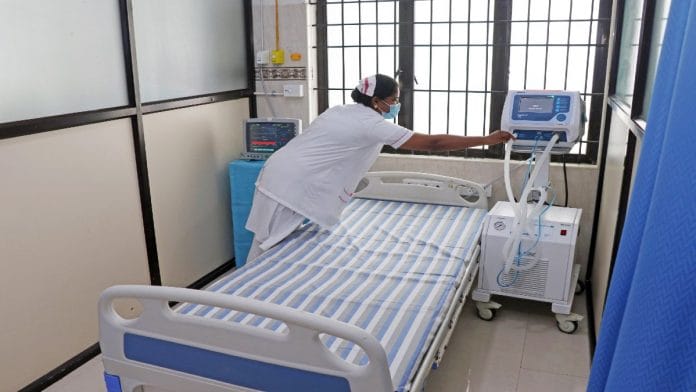New Delhi: A new, yet-to-be peer-reviewed study has shown that the Omicron variant of the coronavirus is unlikely to be able to completely evade antibodies induced by previous Covid infections or vaccines.
Researchers who conducted this study determined this by using an Artificial Intelligence (AI) tool to predict the structure of the SARS-CoV-2 virus variant, based on its mutations, and determine how it will bind with antibodies.
In a study posted on preprint server bioRxiv, researchers found that though the Omicron variant may result in weaker interaction with some antibodies, the effect is not enough for the variant to completely evade the immune response.
The researchers from University of North Carolina in the US worked with the SARS-CoV-2 genome sequence that was shared by the Botswana-Harvard HIV Reference Laboratory on 22 November. The sample was taken from a 59-year-old man with Covid, in Botswana.
The Omicron variant, called a “variant of concern” by the World Health Organization (WHO), has been a cause of mounting concern across the globe.
Also Read: A virus evolution expert explains Omicron and its 50 mutations
How the study was conducted
The study was conducted using the AlphaFold2 — a neural network-based deep learning model created by Google DeepMind — which can predict the protein structure based on the genetic code.
Proteins are the essential building blocks of life. How a protein functions, depends on its 3D structure, which is why figuring out what shapes proteins fold into is critical to understanding biology.
This “protein folding problem” was a challenge in biology for over 50 years, until AI tool AlphaFold was developed in 2018, the researchers said.
Using AI, AlphaFold is able to predict a protein’s structure without laboratory experiments, allowing scientists to quickly understand its functions.
Through computer software, the researchers figured out the sequence of amino acids — the building blocks of proteins — in the receptor binding domain (RBD) of the Omicron variant. RBD is a key part of a virus, located on the spike protein, that allows it to gain entry into cells and lead to infection.
Since information available about how the Omicron variant interacts with antibodies is scant, the researchers turned to “predictive computational methods” to create a model of the “mutated structure of the spike protein’s receptor binding domain” to posit potential changes to vaccine efficacy, said the study.
The team computed the binding energy of the predicted protein structure with antibodies of people who have been previously infected with Covid-19. In physics, ‘binding energy’ describes the energy that would be required to break apart a system of particles. The lower the binding energy, the less stable the bond between two particles.
According to the study, the results suggest that although the predicted structure of the mutated spike protein of the Omicron variant has reduced affinity to antibodies, they will still bind to the variant.
“This result suggests that antibodies elicited from vaccines or a previous infection will provide some protection against Omicron,” the team concluded, according to the study.
Though there are a multitude of mutations in the RBD of Omicron, these mutations do not appear to be causing any large structural change that would totally evade antibody interaction, the team further said.
The results of this study will need to be confirmed in laboratory experiments.
“Given the public health urgency in understanding the impacts of new SARS-CoV-2 variants quickly requires that we act quicker than is possible in a lab,” said the study.
(Edited by Gitanjali Das)
Also Read: Mystery of how Karnataka doctor got Omicron unsolved, but community transmission ‘improbable’






